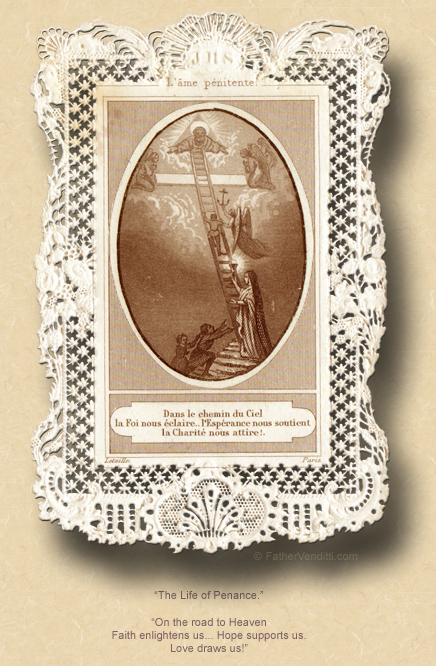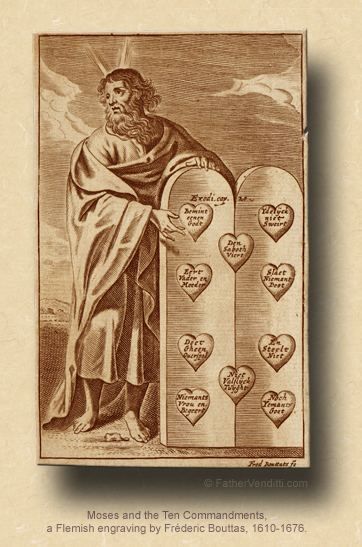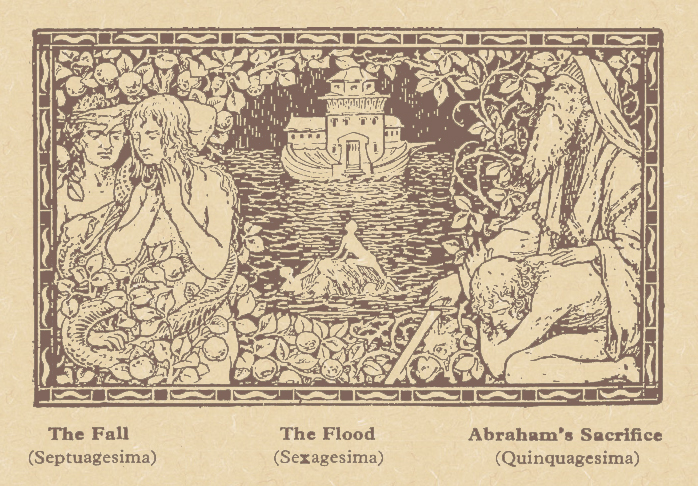…to Avoid the Near Occasions of Sin.
The Sixth Sunday of Ordinary Time.
Lessons from the primary dominica, according to the ordinary form of the Roman Rite:
• Sirach 15: 15-20.
• Psalm 119: 1-2, 4-5, 17-18, 33-34.
• I Corinthian 2: 6-10.
• Matthew 5: 17-37.
[or Matthew 5: 20-22, 27-28, 33-34, 37.]
Sexagesima Sunday.*
Lessons from the dominca, according to the extraordinary form of the Roman Rite:
• II Corinthians 11: 19-33; 12: 1-9.
• [Gradual] Psalm 82: 19, 14.
• [Tract] Psalm 59: 4, 6.
• Luke 8: 4-15.
FatherVenditti.com
|
 7:13 PM 2/16/2020 — For those of you who occasionally hear Mass in the extraordinary form, you would know that last Sunday began what is traditionally known as the Septuagesima season; the priest would already be wearing the purple of Lent, and we would already have replaced the Alleluia with another verse. In English speaking countries, this season was sometimes called “Shrovetide,” because it ends on the day before Ash Wednesday, which was often called “Shove Tuesday.” It's actually a universal practice, and is preserved to this day in every Christian Church that has a serious liturgical tradition, even the more traditional brands of the Anglican and Lutheran communions; in the Eastern Catholic Churches, in which I served for many years, as well as in the Orthodox Churches, it's called the Triodion. It was, of course, eliminated in the ordinary form of the Roman Rite during the reforms following the Second Vatican Council; and, if you go on the Internet, you'll find numerous articles by people wringing their hands over whether that was a good idea, especially since many of those reforms were supposed to be for ecumenical reasons. The best way, I think, to describe Septuagesima is as a preparation for the preparation: if Lent is supposed to prepare us for Easter, then Septuagesima is designed to prepare us for Lent. 7:13 PM 2/16/2020 — For those of you who occasionally hear Mass in the extraordinary form, you would know that last Sunday began what is traditionally known as the Septuagesima season; the priest would already be wearing the purple of Lent, and we would already have replaced the Alleluia with another verse. In English speaking countries, this season was sometimes called “Shrovetide,” because it ends on the day before Ash Wednesday, which was often called “Shove Tuesday.” It's actually a universal practice, and is preserved to this day in every Christian Church that has a serious liturgical tradition, even the more traditional brands of the Anglican and Lutheran communions; in the Eastern Catholic Churches, in which I served for many years, as well as in the Orthodox Churches, it's called the Triodion. It was, of course, eliminated in the ordinary form of the Roman Rite during the reforms following the Second Vatican Council; and, if you go on the Internet, you'll find numerous articles by people wringing their hands over whether that was a good idea, especially since many of those reforms were supposed to be for ecumenical reasons. The best way, I think, to describe Septuagesima is as a preparation for the preparation: if Lent is supposed to prepare us for Easter, then Septuagesima is designed to prepare us for Lent.
Those of you who have no experience with the liturgical tradition of the Latin Church before Vatican II may find it overkill to have a time of preparation for Lent itself; but, you must remember that, in centuries past, Lent was not just a time to prepare ourselves for Easter by giving up chocolate and saying a few extra prayers. When the Church was young—and the Apostles were still preaching the words of our Lord from memory—very few people were born into the faith; they joined the Church as adults. And joining the Church meant a big change in a person’s life, especially in an age of persecution. Lent was a time of intense study, prayer, fasting and personal purification. Baptism, after all, is the restoration of Sanctifying Grace; one should not take it lightly.
And, as in all things, the Church follows the example of our Lord who, before beginning the work he came to do, fasted and prayed in the desert for forty days. He didn’t give up chocolate and television for forty days; he fasted and prayed for forty days. And so, the Church, following a tradition handed down from the Apostles, places great emphasis on this thing we call Lent, so much so that before we even enter into it we take time to prepare with two or three weeks, depending on the date of Easter, during which we gradually ease ourselves into a spirit of self-denial.
Yesterday I returned from an overnight trip to Southern Maryland, and I had the chance to go swimming, but I had not been swimming for a long time, and the water seemed cold to me; so, instead of diving right in—if you can picture such an ungraceful thing—I walked into the water slowly, little by little, splashing myself in order to acclimate to the temperature of the water. That’s what we do during Septuagesima; we acclimate ourselves to, first, acknowledge that we are sinners and need to reform our lives, then we try to accustom ourselves to the notion that, in spite of our sinfulness, God really does want us to reform; and we begin, little by little, to impose upon ourselves that measure of self-denial that makes the reform of our lives possible in grace.
The Eastern Churches have an interesting custom: the two weeks before Lent begins are focused on specific objects for our self-denial: the week of Meatfare is the last week before Easter during which they eat meat, and the week of Cheesefare is the last week in which dairy products are eaten, and during Lent itself they eat neither;  so, they take the idea of fasting during Lent very serious indeed; and, the last Sunday before Lent, which is called Cheesefare Sunday, is also called the Sunday of Forgiveness, because it is presumed that, if one is focused on self-denial so thoroughly, one is going to be something of an annoyance to others, so the idea is that we forgive each other in advance for all the inconvenience that our practices of mortification will cause. so, they take the idea of fasting during Lent very serious indeed; and, the last Sunday before Lent, which is called Cheesefare Sunday, is also called the Sunday of Forgiveness, because it is presumed that, if one is focused on self-denial so thoroughly, one is going to be something of an annoyance to others, so the idea is that we forgive each other in advance for all the inconvenience that our practices of mortification will cause.
But more to the point, I think, as we barrel toward Ash Wednesday on February the twenty-sixth, is the admonition our Scripture lessons present to us to return again to the basics of our faith: the keeping of the Commandments. Both our first lesson from Sirach and our Gospel lesson from Matthew—not to mention today’s psalm—remind us of the necessity of obeying the Commandments. Nothing surprising or earth-shattering in that, but tucked away in our Lord's little sermon today is the concept of the occasions of sin. In our Act of Contrition we routinely promise our Lord that we will avoid them, but we don't often consider how prevalent they can be. Avoiding occasions of sin requires forethought, and so often our sins are the result of having none. Someone who finds himself stumbling upon some pornographic web site while using his computer in the evening hours when vulnerability to the sins of the flesh is most common may have to make a resolution not to touch his computer during those hours of the night; that would be a decision he would make in order to avoid an occasion of sin. Part of the problem is that occasions of sin are subjective: what's an occasion of sin for one person may not be for another. Our eating habits can serve as a good analogy here: I'm a diabetic, and I also have no stomach, having had much of those bits surgically removed; so, when someone puts a slice of double-fudge chocolate cake in front of me, it doesn't tempt me because I know from experience that even just one bite could make me violently ill for the rest of the day; but, someone else may find that slice of cake difficult to resist. In the same way, what's an occasion of sin for one person may not be for another. Another analogy: someone who is not an alcoholic can have a glass of wine with his meal with no consequences, but a recovering alcoholic cannot because even just one sip could result in a binge that would lead to a relapse into drunkenness.
When our Blessed Lord, in his little homily today, says that “whoever breaks one of the least of these commandments and teaches others to do so will be called least in the Kingdom of heaven” (Matt. 5: 19 RM3), He's not talking about someone overtly going around saying, “Let me teach you to break the Commandments”; He's talking about how easily it is for us to—often unwittingly—place someone else in what's an occasion of sin for them, even it is isn't one for us. A text message of a risque nature, for example, may not have any effect on us, but sent to someone else could be an occasion of impurity for that person.
In our regular examination of conscience we should always include a question of whether we’ve done or said anything that could lead another into sin: that's because there are things we could say or do which may have no moral implications for us, but which could lead someone else into a temptation toward sin. How are we supposed to know what might be an occasion of sin for someone else? We can't know. That's why our Lord is so forceful in His words today: when dealing with the souls of others, extreme caution and prudence is always indicated.
Let us ask our Lord today not only for the courage to avoid whatever may lead us into sin, but for an increase in the virtue of prudence, so that nothing we say or do could possibly be an occasion of sin for anyone we may meet along the way.

* Almost all liturgical traditions observe a pre-Lenten season, with the sole exception of the ordinary form of the Roman Rite.
The extraordinary form of the Roman Rite observes a pre-Lenten period lasting for three weeks, known as the Septuagesima Season, consisting of Septuagesima, Sexagesima and Quinquagesima. In English speaking countries, this season is sometimes called “Shrovetide,” because it ends on the day before Ash Wednesday, which is often called “Shove Tuesday.”
The Churches of the Byzantine Rite observe a pre-Lenten season known as the Triodion, lasting for four weeks; it is sometimes preceded by a Sunday “before the Triodion,” as determined by the date of Easter. The first few Sundays of this season are thematic, taken from the Gospel of the day, from which each Sunday gets it’s name. The Sunday before the Triodion is known as the Sunday of Zacchaeus, the First Sunday that of the Publican and Pharisee, and the Second that of the Prodigal Son. The last two Sundays are named after the specific food items which may be eaten during the weekdays prior to them, as the fasting discipline of Lent is gradually imposed: the Sunday of Meatfare and the Sunday of Cheesefare. The day following Cheesefare Sunday is the First Day of the Great Fast, there being no tradition of an "Ash Wednesday."
A pre-Lenten season is also preserved in some of the more traditional branches of the Anglican and Lutheran communions, making the ordinary form of the Roman Rite the only major liturgical Tradition to have completely eliminated it.
|

